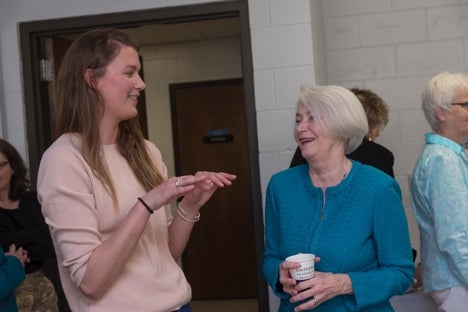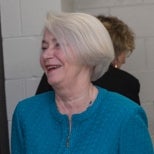University of Washington’s Nancy Woods addresses faculty at URI College of Nursing

KINGSTON, R.I., May 12, 2017 — Team players who remain independent thinkers, persistent scientists who follow the evidence, dedicated caregivers whose research makes a difference in people’s lives… those are the qualities to which doctoral students of nursing, their mentors and college administrator should aspire.
Nancy Woods, dean emerita of the University of Washington School of Nursing and co-director of the de Tornyay Center for Healthy Aging, shared these insights recently with faculty at the University of Rhode Island’s College of Nursing. The field of health care is rapidly evolving, and Ph.D. programs — the pinnacle of nursing education — must be at the forefront of this evolution, said Woods, who shared experiences from her career and advice for educating tomorrow’s nurse scholars.
Woods, a past president of the American Academy of Nursing, noted that there is a shortage of Ph.D. prepared faculty, slow growth in doctoral enrollment and limited financial support for students. At the same time, demand for evidence-based science is increasing, as is the complexity of the problems facing health care professionals.
“We are rethinking Ph.D. education to prepare stewards of nursing,” Woods said of the need to develop leaders who work across disciplines to translate clinical science into real-world applications.
Woods’ professional, academic and research experience led her to rethink scholarship, discovery and knowledge sharing in ways that engage society and bring public accountability to bear on the science of health care. Woods began researching women’s health issues in the 1970s, and her pioneering work helped develop women’s health as a field of study for nursing.
Nurses can be encouraged to pursue scholarship by mentors and educators who value the path to discovery and have walked it themselves. “It is not adequate to just print a list of publications and grants. Nurse scholars should ask, ‘What is the impact beyond scientific understanding,’” she noted.
Effective mentorship begins at the time of a student’s enrollment, guides learning through the dissertation process and extends beyond graduation, she said. To keep students engaged, mentors can encourage new ways of thinking about problems and focus students’ research on what can come next. And because most Ph.D. students are working while going to school, mentors need to remain flexible and accessible throughout this journey, Woods said.

